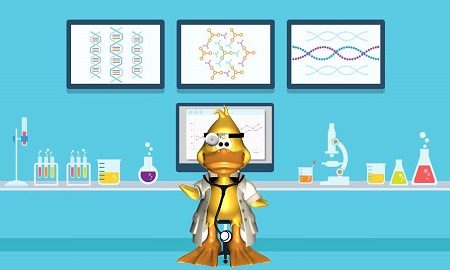A duck dressed as a scientist is still a duck. And a pseudoscientific theory dressed up like real science is still pseudoscience. That just leaves the question: is evolution pseudoscience? Fortunately, that’s an easy question to answer: yes. And even better, you don’t need to be a scientist to recognize a pseudoscience, just as you don’t need to be a doctor to recognize the difference between a human and a non-human like a duck. Anyone who knows what a “human” and a “duck” is can easily discern the difference. And anyone who knows what “science” and “pseudoscience” is will likewise easily discern the difference.
As you are probably already aware, a favored tactic of proponents of evolution is to label both Creation and Intelligent Design disciplines as “pseudosciences.” The irony of course being that it is a trivial matter to demonstrate that Darwinian goo-to-you evolution is the epitome of a pseudoscience. Yet regardless of how clear the evidence is, you will never, ever get an evolutionist to acknowledge that Darwinian molecules-to-man evolution is a pseudoscience. So in this article we’ll first take a look at how Darwinian evolution fits the definition of a pseudoscience perfectly; then press on to demonstrate how evolution breaks a number of the known laws of science further proving it to be pseudoscience in spite of their protestations that “it’s science.”
According to the bastion of popular secular knowledge known as Wikipedia, a pseudoscience is:
“…a claim, belief, or practice presented as scientific, but which does not adhere to the scientific method. A field, practice, or body of knowledge can reasonably be called pseudoscientific when it is presented as consistent with the norms of scientific research, but it demonstrably fails to meet these norms.”[1]
So one cannot know whether something is a pseudoscience until one first understands the scientific method. Again, according to Wikipedia, the scientific method is:
“a body of techniques for investigating phenomena, acquiring new knowledge, or correcting and integrating previous knowledge. To be termed scientific, a method of inquiry is commonly based on empirical or measurable evidence subject to specific principles of reasoning. The Oxford English Dictionary defines the scientific method as “a method or
procedure that has characterized natural science since the 17th century, consisting in systematic observation, measurement, and experiment, and the formulation, testing, and modification of hypotheses.”[2]
Evolution fits the definition of a pseudoscience
Evolution fits every criteria necessary to be identified as a pseudoscience: Continue Reading

